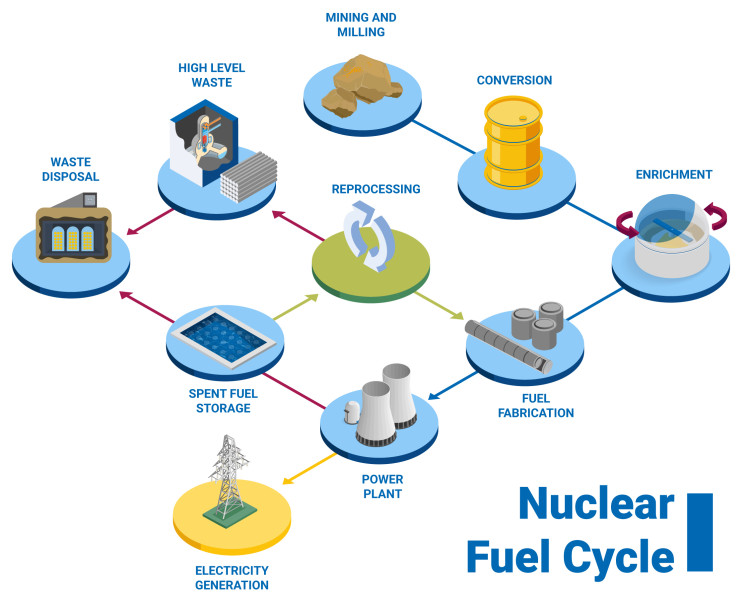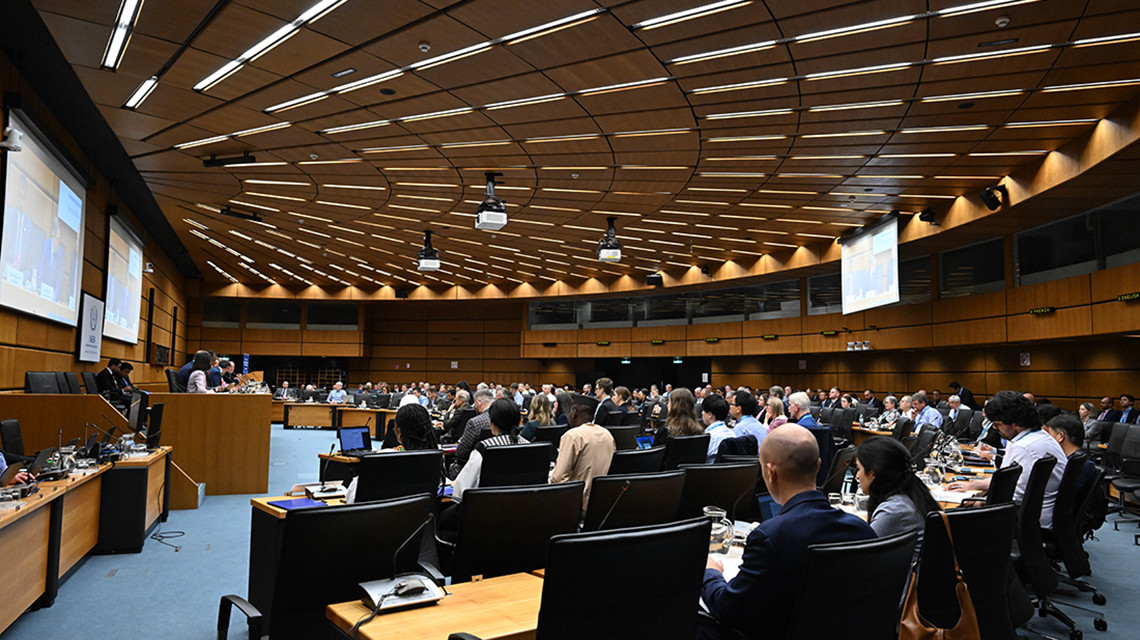A major conference on managing spent nuclear fuel from power reactors is taking place at the IAEA this week.
The IAEA is hosting the International Conference on the Management of Spent Fuel from Nuclear Power Reactors from 10-14 June at its headquarters in Vienna.
Held approximately once every four years since 1987, this year the conference will focus on national strategies for managing spent fuel, including from advanced technologies such as small modular reactors (SMRs), and how this supports an increased role for nuclear power in the global energy mix.
Of the world's 430 000 tonnes of spent fuel, 30 per cent has already been reprocessed for recycling, while the remainder is safely stored in either wet or dry storage systems ahead of eventual disposal in an underground repository or for future recycling.

The high level waste left over from reprocessing is safely stored awaiting eventual disposal in an underground repository too.
During his opening speech, Director General Rafael Mariano Grossi, said: "The moment requires us to be laser focused on all the spent fuel issues that need to be discussed, ranging from repositories to transportation, and all the other topics that will be represented here. The increase that we are going to see in nuclear activity will lead to an increase in the volume of spent fuel that needs to be reprocessed or stored, which means that we need to as a community, as an industry, as regulators, provide the necessary answers."
Spent fuel is generated at a rate of approximately 10 000 tonnes per year, and new forms of spent fuel from planned innovative reactors may require adjusting current technologies or developing new ones.

"Spent nuclear fuel has been successfully managed for many decades, and while the established practices are safe and effective, it is important for the nuclear power community to be adaptive as the energy landscape evolves," said Amparo Gonzalez Espartero, the IAEA's Technical Lead for Spent Fuel Management and Co-Scientific Secretary of the conference.
"It is vital that all countries with spent fuel management responsibilities, current and future, proactively meet the moment, and this conference represents a great opportunity to share lessons learned and discuss innovative techniques as well as their potential integration in the current programmes."
Across the world, considerable progress is being made in the areas of both recycling and disposal of nuclear fuel after it has been used to generate power. Spent fuel retains more than 90 per cent of its potential energy even after five years of use in a nuclear power reactor. Recycling spent fuel involves recovering fissile and fertile materials, through reprocessing the spent fuel, so that they can be used as new nuclear fuel.
Russia is looking to expand its commercial reprocessing capacity from 400 tonnes per year to up to 1600 tonnes annually over the next 10-15 years, while France announced earlier in March that it plans to extend its existing recycling facilities beyond 2040 and construct additional facilities as well.
Operations at Finland's Onkalo spent fuel repository, the world's first deep geological repository for final disposal of high level radioactive waste, are set to begin around 2025, while Sweden commenced construction of its own final repository facility earlier this year. In France, the construction licence application for the Centre Industriel de stockage Géologique (CIGEO) facility for high level waste disposal was submitted in 2023, with authorization expected by 2027. Canada is preparing to select a site for its deep geological repository by the end of 2024.
"As with spent fuel from existing reactors, and taking into account the lessons of the past, early planning for the long-term safe management of spent fuel from new technologies is a national responsibility," said Gerard Bruno, Head of the IAEA Radioactive Waste & Spent Fuel Management Unit and Co-Scientific Secretary of the conference. "The IAEA remains available to provide appropriate support for the safe management, including disposal, of spent fuel and all types of radioactive waste."
The conference will consist of panel sessions on national strategies, innovation including how new technologies can be integrated into current spent fuel management strategies, and stakeholder engagement as well as technical sessions on topics including storage, recycling (current and future technologies), transportation, the impacts of advanced energy systems and integrated management of spent fuel.

Director General Rafael Mariano Grossi addresses the International Conference on the Management of Spent Fuel from Nuclear Power Reactors on 10 June at IAEA headquarters in Vienna. (Photo: D.Calma/IAEA)
How the IAEA supports countries with spent fuel management
The IAEA supports countries in preparing to manage new spent fuels from innovative reactors (such as SMRs) through the Coordinated Research Project on Challenges, Gaps and Opportunities for Managing Spent Fuel from Small Modular Reactors (SMR-COGS) aimed at building specific roadmaps for the back end of the fuel cycle for all envisaged SMR reactor technologies and fuels. The IAEA has collated more than four decades of research, development and operational experience on the behaviour of spent fuel and cladding under wet and dry storage conditions.
The IAEA also assists the spent fuel management community in characterising and understanding the behaviour of fuel debris and melted fuel-containing materials resulting from the March 2011 Fukushima Daiichi nuclear power plant accident as part of the IAEA safety action plan towards the decommissioning of the Fukushima Daiichi site.
The Agency offers an integrated peer review service for radioactive waste and spent fuel management, decommissioning and remediation programmes, called ARTEMIS.
The IAEA is also working to make sure that safety standards - developed for the safety of spent fuel and radioactive waste management for existing nuclear technologies remain applicable to the safe management of the spent fuel and waste arising from innovative and advanced reactors.






